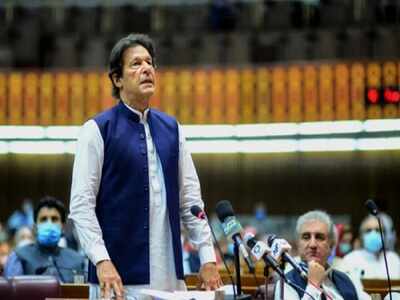
NEW DELHI: The Imran Khan-led PTI government has been in the news in Pakistan due to the controversy regarding the dual nationalities of special assistants to the Prime Minister.
Meanwhile, Kulbhushan Jadhav's second consular access, vandalism of a rare Buddha statue and threat to China's ambitious Belt and Road projects were among the other issues that featured in the media across the border.
Meanwhile, Kulbhushan Jadhav's second consular access, vandalism of a rare Buddha statue and threat to China's ambitious Belt and Road projects were among the other issues that featured in the media across the border.
Here is a weekly round-up of developments in Pakistan:
1
Imran Khan govt under fire for dual national SAPMs
Six advisors of Pakistan Prime Minister Imran Khan possess dual citizenships and several of his top 20 aides have admitted to owning movable and immovable assets worth millions of dollars abroad, as per media reports.
The list was published on the official website of Pakistan government's cabinet division.
All the dual nationals were working as special assistants to the prime minister (SAPM). These people include SAPM on Overseas Pakistanis Syed Zulfiqar Abbas Bukhari (UK), SAPM on Power Division Shahzad Qasim (US), SAPM on Petroleum Nadeem Babar (US), SAPM on Political Affairs Shahbaz Gill (US), SAPM on Parliamentary Coordination Nadeem Afzal Gondal (Canada) and SAPM on Digital Pakistan Tania Aidrus (Canadian citizenship by birth, according to media reports.
Opposition parties have launched a broadside against the PTI-led federal government for appointing special assistants to the PM holding dual nationalities and permanent residency of other countries despite Imran Khan’s stance in the past that such individuals should not run government affairs.
PML-N spokesperson Marriyum Aurangzeb questioned Khan’s move to allow people with dual nationalities to make decisions about the fate of the country, reported The Tribune.
The newspaper said that Sindh government spokesperson Murataza Wahab described the presence of individuals with dual nationalities in the federal cabinet a "security risk".
PPP MNA Nafisa Shah demanded that the government should inform the nation about the action being taken in the wake of the disclosure of the new information, according to The Tribune.
She questioned as to how those who had pledged their allegiance to another country could be expected to be sincere with Pakistan.
The list was published on the official website of Pakistan government's cabinet division.
All the dual nationals were working as special assistants to the prime minister (SAPM). These people include SAPM on Overseas Pakistanis Syed Zulfiqar Abbas Bukhari (UK), SAPM on Power Division Shahzad Qasim (US), SAPM on Petroleum Nadeem Babar (US), SAPM on Political Affairs Shahbaz Gill (US), SAPM on Parliamentary Coordination Nadeem Afzal Gondal (Canada) and SAPM on Digital Pakistan Tania Aidrus (Canadian citizenship by birth, according to media reports.
Opposition parties have launched a broadside against the PTI-led federal government for appointing special assistants to the PM holding dual nationalities and permanent residency of other countries despite Imran Khan’s stance in the past that such individuals should not run government affairs.
PML-N spokesperson Marriyum Aurangzeb questioned Khan’s move to allow people with dual nationalities to make decisions about the fate of the country, reported The Tribune.
The newspaper said that Sindh government spokesperson Murataza Wahab described the presence of individuals with dual nationalities in the federal cabinet a "security risk".
PPP MNA Nafisa Shah demanded that the government should inform the nation about the action being taken in the wake of the disclosure of the new information, according to The Tribune.
She questioned as to how those who had pledged their allegiance to another country could be expected to be sincere with Pakistan.
2
Pakistan provides consular access to Kulbhushan Jadhav; India says meeting not meaningful
Pakistan on July 16 provided consular access to Indian prisoner Kulbhushan Jadhav, but the Indian government said the access was "neither meaningful nor credible," and the death row prisoner appeared visibly under stress.
Jadhav, the 50-year-old retired Indian Navy officer, was sentenced to death by a Pakistani military court on charges of espionage and terrorism in April 2017. India approached the International Court of Justice against Pakistan for denial of consular access to Jadhav and challenging the death sentence.
On Thursday, Pakistan Foreign Office claimed that two consular officers of the Indian High Commission in Islamabad were provided "unimpeded and uninterrupted" consular access to Jadhav.
Though Pakistan Foreign ministry had assured India that the consular access would be unimpeded, unhindered and unconditional, it turned out that the arrangements of the meeting were not in accordance with the assurances made by Islamabad, external affairs ministry spokesperson Anurag Srivastava said in New Delhi.
"The Consular Officers were not given unimpeded, unhindered and unconditional access" to Jadhav. On the contrary, Pakistani officials with an intimidating demeanour were present in close proximity of Jadhav and Consular Officers despite the protests of the Indian side, Srivastava said.
"Jadhav himself was visibly under stress and indicated that clearly to the Consular Officers. The arrangements did not permit a free conversation between them," the MEA spokesperson said.
Jadhav, the 50-year-old retired Indian Navy officer, was sentenced to death by a Pakistani military court on charges of espionage and terrorism in April 2017. India approached the International Court of Justice against Pakistan for denial of consular access to Jadhav and challenging the death sentence.
On Thursday, Pakistan Foreign Office claimed that two consular officers of the Indian High Commission in Islamabad were provided "unimpeded and uninterrupted" consular access to Jadhav.
Though Pakistan Foreign ministry had assured India that the consular access would be unimpeded, unhindered and unconditional, it turned out that the arrangements of the meeting were not in accordance with the assurances made by Islamabad, external affairs ministry spokesperson Anurag Srivastava said in New Delhi.
"The Consular Officers were not given unimpeded, unhindered and unconditional access" to Jadhav. On the contrary, Pakistani officials with an intimidating demeanour were present in close proximity of Jadhav and Consular Officers despite the protests of the Indian side, Srivastava said.
"Jadhav himself was visibly under stress and indicated that clearly to the Consular Officers. The arrangements did not permit a free conversation between them," the MEA spokesperson said.
3
Rare Buddha statue vandalised in Pak nearly 1,700-year old, belonged to Gandhara civilisation
A rare life-sized statue of Buddha that was smashed into pieces with a sledgehammer by construction workers in Pakistan's northwest Khyber-Pakhtunkhwa province belonged to the Gandhara civilisation and was nearly 1,700 years old, a senior official has said.
Four people were arrested on Saturday for vandalising the statue that was discovered during excavation at an agriculture farm in tehsil Takht Bhai of Mardan district. The suspects had followed the orders of a local Maulvi (prayer leader), Dawn reported.
The arrests were made after a video went viral on social media showing a man smashing the statue, parts of which were still embedded underground, into pieces with a sledgehammer. Other construction workers can be seen looking on as the statue is being destroyed while a couple of people were making videos.
Director Archeology and Museums Khyber-Pakhtunkhwa Abdus Samad Khan said on Sunday that the pieces of the destroyed statue have been recovered to assess its archaeological value.
"Apparently it was an ancient one. We lost it," he told reporters on Sunday.
Four people were arrested on Saturday for vandalising the statue that was discovered during excavation at an agriculture farm in tehsil Takht Bhai of Mardan district. The suspects had followed the orders of a local Maulvi (prayer leader), Dawn reported.
The arrests were made after a video went viral on social media showing a man smashing the statue, parts of which were still embedded underground, into pieces with a sledgehammer. Other construction workers can be seen looking on as the statue is being destroyed while a couple of people were making videos.
Director Archeology and Museums Khyber-Pakhtunkhwa Abdus Samad Khan said on Sunday that the pieces of the destroyed statue have been recovered to assess its archaeological value.
"Apparently it was an ancient one. We lost it," he told reporters on Sunday.
4
'Attacks by Baloch separatists increase risks, costs of BRI projects'
A surge in the deadly attacks by Baloch separatists in Pakistan has increased the risks and costs of China's ambitious Belt and Road projects, including the CPEC, while its interests at the strategic Gwadar Port on the Arabian Sea are caught up in the proxy war between Islamabad and Tehran, according to a media report.
Security risks and costs of the $60 billion China-Pakistan Economic Corridor (CPEC) are rising amid a resurgence of the deadly attacks by separatists in the troubled Balochistan province, home to the Chinese-operated Gwadar Port, a report in Hong Kong-based South China Morning Post said on Saturday.
In the third such attack since May, militants opened fire on a patrolling paramilitary convoy in Panjgur district on Tuesday, killing three soldiers and wounding eight others, including an army colonel. Militant ethnic Baloch factions have also recently expanded their range of operations to adjoining Sindh province and its provincial capital Karachi, according to the report.
Beijing's stakes in Sindh are as high as they are in resource-rich Balochistan, it said.
“Baloch groups have not only intensified their attacks but also expanded the outreach of their terrorist violence beyond Balochistan, but it is hard to predict whether this trend will persist,” Mohammad Amir Rana, director of the Pakistan Institute for Peace Studies, an Islamabad-based think tank, told the Post.
Beijing's political risks are also escalating because of a renewed wave of public anger in many parts of Balochistan against human rights abuses by Pakistani troops deployed to crush the low-intensity insurgency in the province, the report said.
Security risks and costs of the $60 billion China-Pakistan Economic Corridor (CPEC) are rising amid a resurgence of the deadly attacks by separatists in the troubled Balochistan province, home to the Chinese-operated Gwadar Port, a report in Hong Kong-based South China Morning Post said on Saturday.
In the third such attack since May, militants opened fire on a patrolling paramilitary convoy in Panjgur district on Tuesday, killing three soldiers and wounding eight others, including an army colonel. Militant ethnic Baloch factions have also recently expanded their range of operations to adjoining Sindh province and its provincial capital Karachi, according to the report.
Beijing's stakes in Sindh are as high as they are in resource-rich Balochistan, it said.
“Baloch groups have not only intensified their attacks but also expanded the outreach of their terrorist violence beyond Balochistan, but it is hard to predict whether this trend will persist,” Mohammad Amir Rana, director of the Pakistan Institute for Peace Studies, an Islamabad-based think tank, told the Post.
Beijing's political risks are also escalating because of a renewed wave of public anger in many parts of Balochistan against human rights abuses by Pakistani troops deployed to crush the low-intensity insurgency in the province, the report said.
5
Pak aviation authority suspends 15 more pilots having fake licenses
Pakistan's aviation authority has suspended 15 more pilots for possessing dubious licenses, taking the number of those taken off duty for flying with fake credentials in the country to 93, according to a media report on Saturday.
According to the Dawn newspaper, these are among the 262 pilots, who were grounded and put under investigation by the aviation ministry last month, for possessing suspicious licences. The licences of 28 other pilots have already been cancelled.
Abdul Sattar Khokhar, Spokesman for the Aviation Division, said a total of 262 pilots were identified as possessing fake licences by the Board of Inquiry and grounded immediately after identification on the instructions of the government.
He said out of these 262 pilots, the federal Cabinet had approved cancellation of the licences of 28.
According to the Dawn newspaper, these are among the 262 pilots, who were grounded and put under investigation by the aviation ministry last month, for possessing suspicious licences. The licences of 28 other pilots have already been cancelled.
Abdul Sattar Khokhar, Spokesman for the Aviation Division, said a total of 262 pilots were identified as possessing fake licences by the Board of Inquiry and grounded immediately after identification on the instructions of the government.
He said out of these 262 pilots, the federal Cabinet had approved cancellation of the licences of 28.
6
UN blacklists Pakistan Taliban terror group's leader
The Tehrik-e-Taliban Pakistan terror group's leader Noor Wali Mehsud has been designated as a global terrorist by the UN for participating in the financing, planning and perpetrating acts on behalf of and in support of entities associated with al-qaeda.
The UN Security Council's 1267 ISIL and al-qaida Sanctions Committee added Mehsud, 42, to the ISIL (Da'esh) and al-qaida Sanctions List on Thursday, subjecting the Pakistani national to an assets freeze, travel ban and arms embargo.
The Sanctions Committee said that Mehsud was listed for "participating in the financing, planning, facilitating, or perpetrating of acts or activities by, in conjunction with, under the name of, on behalf of, or in support of" entities associated with al-Qaeda.
In June 2018, Mehsud was named the leader of Tehrik-e-Taliban Pakistan (TTP), following the death of former TTP leader Maulana Fazlullah.
The TTP was blacklisted by the UN on July 29, 2011 for its association with al-qaeda.
Pakistan on Friday welcomed the designation of Mehsud as a global terrorist.
The UN Security Council's 1267 ISIL and al-qaida Sanctions Committee added Mehsud, 42, to the ISIL (Da'esh) and al-qaida Sanctions List on Thursday, subjecting the Pakistani national to an assets freeze, travel ban and arms embargo.
The Sanctions Committee said that Mehsud was listed for "participating in the financing, planning, facilitating, or perpetrating of acts or activities by, in conjunction with, under the name of, on behalf of, or in support of" entities associated with al-Qaeda.
In June 2018, Mehsud was named the leader of Tehrik-e-Taliban Pakistan (TTP), following the death of former TTP leader Maulana Fazlullah.
The TTP was blacklisted by the UN on July 29, 2011 for its association with al-qaeda.
Pakistan on Friday welcomed the designation of Mehsud as a global terrorist.
Download
The Times of India News App for Latest World News

Coronavirus outbreak
Trending Topics
LATEST VIDEOS
More from TOI
Navbharat Times
Featured Today in Travel
Get the app









